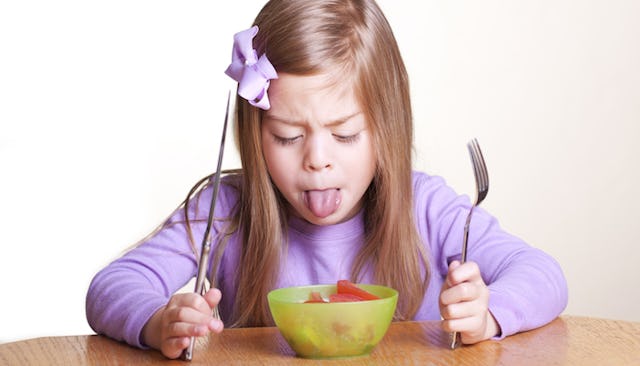Some Kids Are Picky Eaters. The End.

Bee Wilson claims you can shape a kid’s eating habits, but sometimes kids are just picky no matter what their parents do.
Feeding kids is a struggle for most parents, but luckily food writer Bee Wilson is here to let us all know how easy it is. She’s the author of a new book called First Bite that examines how genetics and early feeding patterns help shape our palates, and she’s marketing it by hilariously telling parents they’ve got tons of control over what their children eat.
Wilson says the key to raising healthy eaters is to start introducing foods as early as possible, including in the womb. She tells NPR‘s Terry Gross she’s seen studies that show amniotic fluid takes on the flavor of foods eaten by pregnant moms, and that breastmilk even takes on various tastes depending on what moms eat. So, she says, “the things that our mothers eat, even before we’re born, affect the way we’ll respond to those flavors,” and we can train kids to like healthy food.
Further, she adds, babies have a flavor window from the ages of four to seven months, during which they’ll readily eat anything. If you introduce new foods during this window, she says, “they seem familiar when they encounter them again as toddlers” and you won’t have picky eaters.
Excuse me while I dissolve into a fit of laughter.
Most parents are familiar with the magical “flavor window” Wilson talks about, but it also magically disappears. My kids ate everything when they were babies — raw tomatoes, exotic seasonings, vegetables, seafood. Like all first-time parents, I walked around with a smug grin, so pleased with my adventurous, healthy eaters and how I’d managed to avoid the “picky eater” classification. Then, the toddler years happened and reality punched me in the face with a fistful of pears they refused to eat because they tasted “too pear-y.”
Toddlerhood is a treacherous and unyielding hellscape, littered with broken dreams and the rinds of rejected cantaloupes. Even if you did everything right — even if you raised your infant in the organic section of a Whole Foods — toddlerhood ruins everything. It doesn’t matter how many foods you squeezed into their “flavor window” or how much kale you shoved into your face-hole while you were pregnant. Sometimes, they just aren’t having it, and that is not your fault.
The problem with advice like Wilson’s is that it only adds to our culture of parental blame and guilt. Dozens of comments on the NPR piece lamented parents these days and the way we feed our kids nothing but junk. In particular, people echoed Wilson’s sentiment that kids will eat healthy foods if they’re introduced to healthy foods, and if they’re bad eaters, it must be because their parents made them that way.
Except, that’s not true. If it were as simple as only offering “the right foods,” picky eaters wouldn’t exist. But they do, despite our best efforts, and it’s time we stopped blaming each other for not trying hard enough, or riding around on our high horses when our kid happens to be slightly more adventurous than someone else’s. As a parent, it’s tiresome to be told constantly that we’re failing our kids in the kitchen; to have the same stupid tips about offering a “wide variety of foods early and often” thrown at us over and over again like it’s some new concept we never would’ve discovered on our own. Never mind that some people can’t afford to be “adventurous” with food and waste money on things they’re not certain their children will eat.
We all want our kids to be healthy eaters. No one goes into parenthood intending to create a person who only eats peanut butter sandwiches, but things happen. Friends and schools introduce junk food, kids develop food aversions or sensory disorders, and sometimes kids just decide they don’t like cheese anymore on a random Thursday night because they’re kids and that’s what they do. As lovely as it is to imagine a world where we can program kids to love greens and hate candy, it’d be a hell of a lot better if we could just admit that kids are hard and give each other a fucking break once in a while.